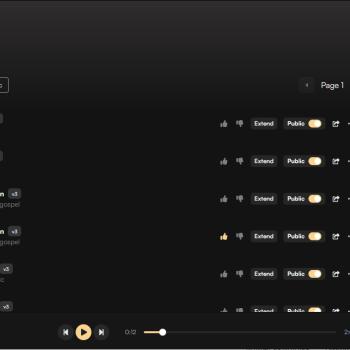I found a variety settings of “When David Heard” from across time to be very useful in my class on the Bible and music. On the one hand, the text itself is interesting, and the choice to set it (sometimes in relation to historical circumstances that make it seem relevant) illuminates the interplay between ancient text and later composers and their historical context. On the other hand, the comparison allowed me to address the question of why older music often sounds boring to listeners today. The simple fact is that our ears become accustomed to certain sounds, so that things which once sounded innovative and fresh come to sound archaic and old hat. If this is true with music from the 1950s, how much more so will it be true of music from the 1650s?
And so I shared Thomas Tomkins’ setting, which sounds a lot like any other music of its time to most modern listeners, especially on a first hearing. The harmonic language is clearly that of a bygone era, even if we can recognize the composer’s skill.
Robert Ramsey’s setting strikes us in much the same way.
I then compared that with Eric Whitacre’s setting, which premiered in 1999:
You can read about Whitacre’s perspective on the text and setting it to music on his website. A listener today will agree that this music is anything but boring. It has moments of dissonance which grab us, using a modern idiom so that the connection to our ears, brains, and emotions is more direct.
There is a takeaway lesson for those thinking about religious traditions. If you merely repeat the same words in the same way as were shared in bygone generations, the impact will not be the same. What once was provocative, fresh, innovative, and even radical may be conservative, trite, dull, and backwards-looking.
Those who have ears to hear, let them hear…
Before ending this post, let me share one more contemporary setting of “When David Heard,” one that is less widely known than Whitacre’s, that by Norman Dinerstein:
Do you have a favorite setting of these words from the Bible? Which setting makes the text come alive in a fresh way for you as a listener today?
Of related interest, there is a call for papers for a conference about music and death, at which work on musical settings such as those discussed in this post would fit in perfectly.













